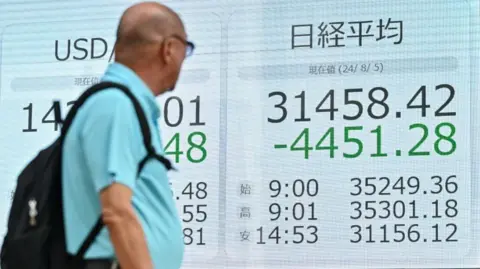 Getty Images
Getty ImagesEuropean stock markets fell on Monday following steep drops in Asia amid fears that the US economy is heading for a slowdown.
In London, the FTSE 100 index fell by 2.1% while in Paris the CAC-40 dropped by 2.2% and Frankfurt’s DAX slid by 2.4%.
Earlier, Asian markets plummeted, with Japan’s Nikkei 225 down 12.4% or 4,451 points in the biggest fall by points in history.
It comes as weak jobs data in the US on Friday sparked concerns about the world’s largest economy.
Meanwhile, the yen has been strengthening against the US dollar since the Bank of Japan raised interest rates last week, making stocks in Tokyo more expensive for foreign investors.
Stock markets in Taiwan, South Korea, India, Australia, Hong Kong and Shanghai all tumbled.
Weaker-than-expected economic data from the US has fuelled speculation that its economy is slowing.
At the same time, the US Federal Reserve held off cutting interest rates last week in contrast to other central banks such as the Bank of England.
While the Bank of England’s first cut in interest rates in over four years is widely seen as a sign the UK economy is turning a corner, if there are concerns about the US economy that can spook markets everywhere.
There has also been concern that shares in technology companies, such as those focused on artificial intelligence (AI), have been overvalued and are now facing difficulties.
Intel announced major layoffs last week as well as disappointing financial results, and there is speculation that its rival Nvidia, which makes AI chips, will delay its latest launch.
The US Nasdaq index, which contains a large number of technology firms, hit a record high last month but last week tumbled by around 10% in what is known as a “correction”.
Meanwhile, veteran US investor Warren Buffett’s firm Berkshire Hathaway revealed that it had sold about half its stake in US technology giant Apple.
The Dow Jones Industrial Average also dropped 1.5% on Friday, and the S&P 500 ended 1.8% lower.
‘Too much’
Tomochika Kitaoka, chief equity strategist at Nomura Securities, said US economic slowdown worries were “too much”.
“But the [Japanese] market did turn nervous after the Bank of Japan’s rate hike as they thought the domestic economy is not strong enough to justify the rate hike.”
Unlike other central banks, the Bank of Japan lifted interest rates last week to the highest level since the global financial crisis in 2008.
Inflation in Japan rose by more than expected in June while the economy shrank in the first three months of the year because of a weaker yen and poor household spending.
The Japanese currency has strengthened more than 10% against the US dollar over the last month.
A stronger yen makes Japanese goods more expensive, and consequently less attractive for potential overseas buyers.
Elsewhere in the Asia-Pacific region, stock markets fell between 1.4% and 8%.
Cryptocurrencies were also down. Bitcoin dropped to around $50,000, its lowest level since February.
Unemployment
Friday’s sharp fall in US stock prices followed weak jobs data.
In July, US employers added 114,000 roles, far fewer than expected while the unemployment rate ticked up from 4.1% to 4.3%.
The figures raised concerns that a long-running jobs boom in the US might be coming to an end.
It stoked speculation about when – and by how much – the Federal Reserve will cut interest rates.
Simon French, chief economist and head of research at Panmure Liberum, said it was not yet clear if the jobs figures were an aberration because of Hurricane Beryl in July or was first sign that companies are hiring fewer workers.
The most recent data showed that the US economy grew at an annual rate of 2.8%.
On whether the US is heading for a slowdown, Shanti Kelemen, chief investment officer at M&G Wealth, told the BBC’s Today programme said it could go either way.
“You can pick out evidence to create a positive story, you can also pick out the evidence to create a negative story,” she said.
“I don’t think it universally points to one direction yet.”
